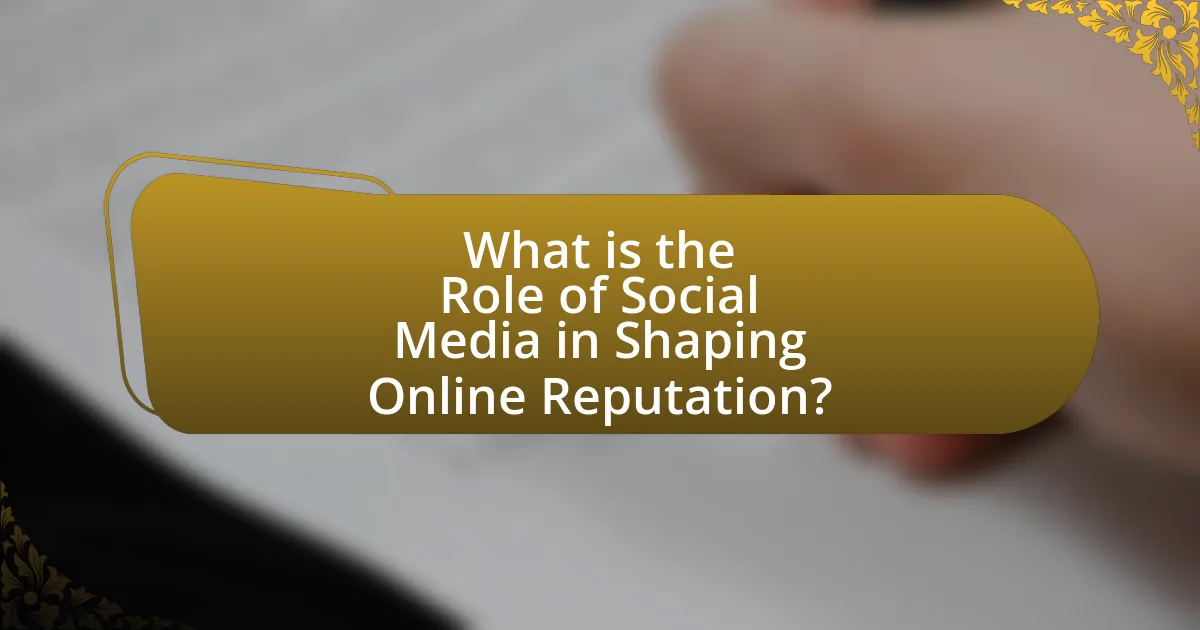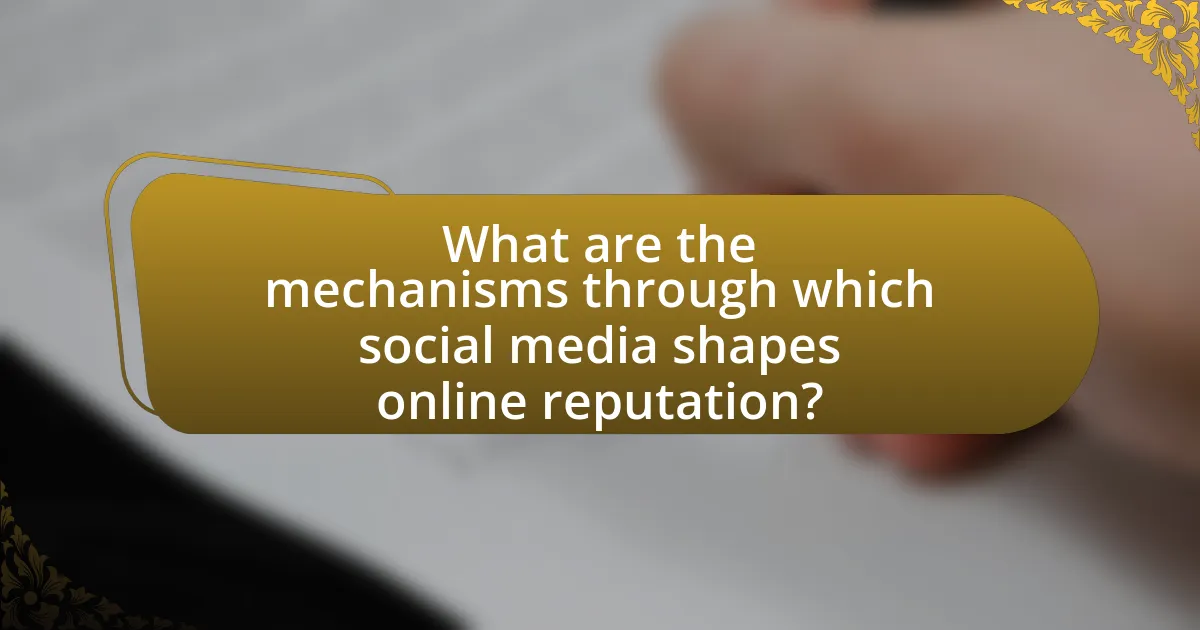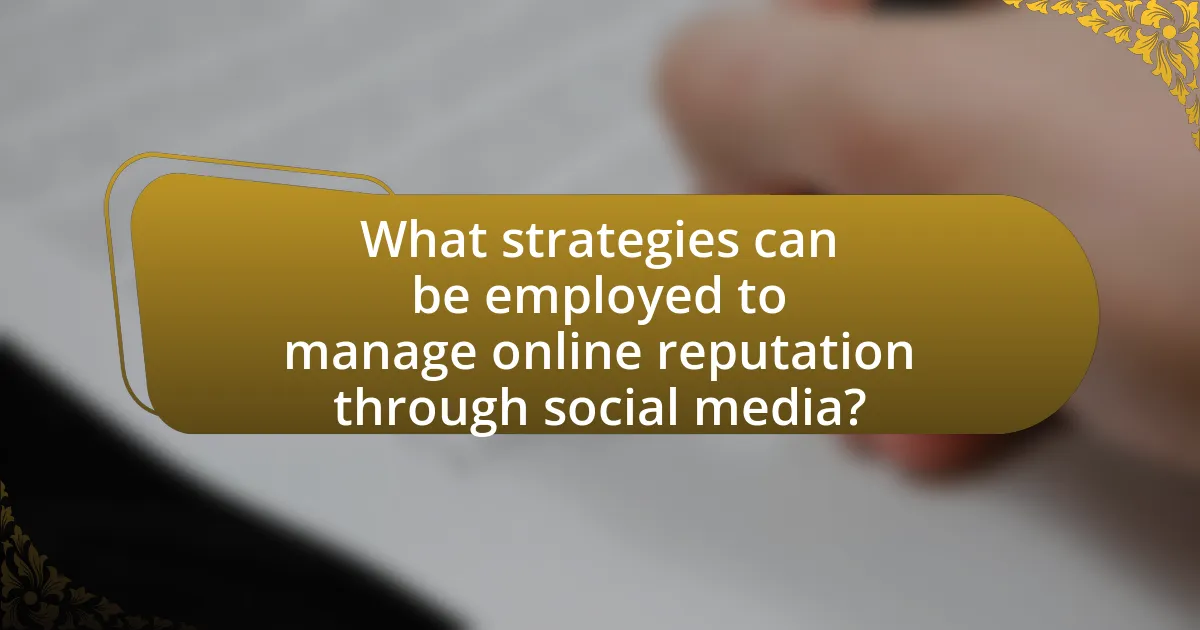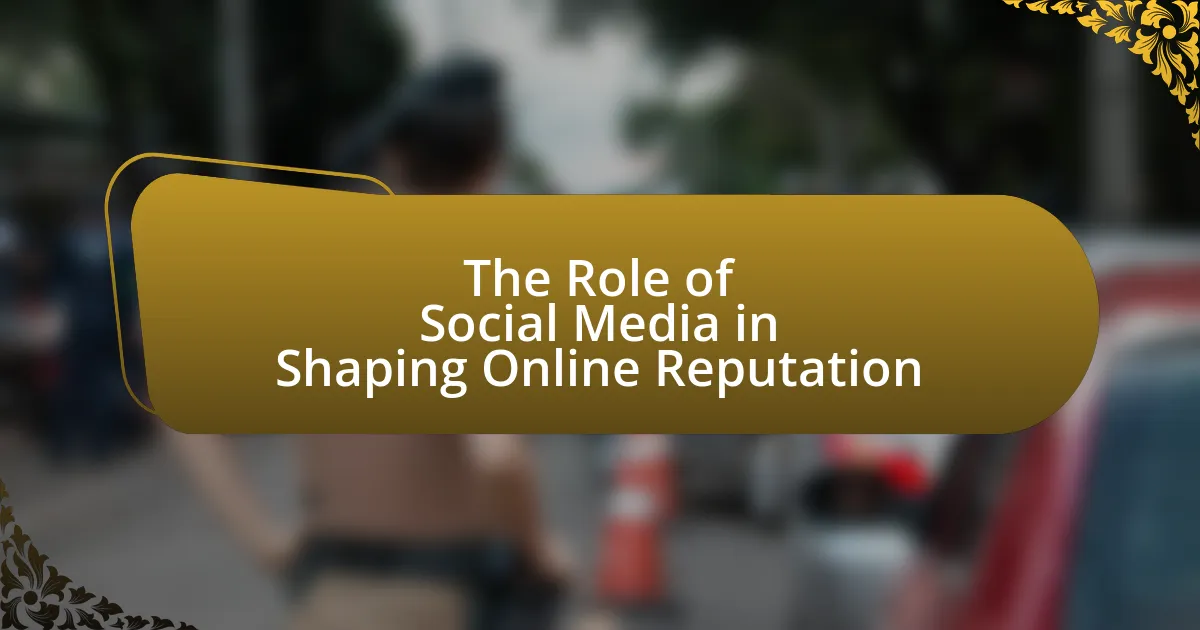Social media is a pivotal force in shaping online reputation, facilitating real-time communication and feedback between individuals, brands, and their audiences. The article explores how social media influences public perception through user-generated content, engagement metrics, and algorithmic visibility, highlighting the importance of user interactions and response times in reputation management. It also examines the impact of online reputation on businesses and individuals, emphasizing the significance of positive testimonials and the detrimental effects of negative feedback. Strategies for managing online reputation, including proactive engagement and content creation, are discussed, along with common pitfalls to avoid in the digital landscape.

What is the Role of Social Media in Shaping Online Reputation?
Social media plays a crucial role in shaping online reputation by facilitating real-time communication and feedback between individuals, brands, and their audiences. This platform allows users to share experiences, opinions, and reviews, which significantly influence public perception. For instance, a study by the Pew Research Center found that 70% of adults in the U.S. use social media, and 40% of them have shared their opinions about products or services online, demonstrating the power of social media in shaping consumer perceptions. Additionally, negative comments or reviews can spread rapidly, impacting a brand’s reputation almost instantaneously, while positive interactions can enhance credibility and trust. Thus, social media serves as both a tool for reputation management and a battleground for public opinion.
How does social media influence public perception?
Social media significantly influences public perception by shaping the narratives and information that individuals consume. Platforms like Facebook, Twitter, and Instagram allow users to share opinions, news, and experiences, which can rapidly alter how people view events, brands, or individuals. For instance, a study by the Pew Research Center found that 64% of Americans believe social media has a major impact on their views about political issues, demonstrating its power in shaping public opinion. Additionally, social media algorithms prioritize content that generates engagement, often amplifying sensational or polarizing information, which can skew public perception further.
What are the key factors that contribute to online reputation on social media?
Key factors that contribute to online reputation on social media include user engagement, content quality, and response time. User engagement, measured by likes, shares, and comments, reflects how well a brand connects with its audience, influencing public perception. Content quality, which encompasses relevance, originality, and accuracy, directly affects how users perceive a brand’s credibility and trustworthiness. Response time, or how quickly a brand addresses inquiries and feedback, plays a crucial role in shaping user satisfaction and loyalty. Research indicates that brands with high engagement rates and prompt responses tend to enjoy a more favorable online reputation, as evidenced by a study from Sprout Social, which found that 70% of consumers are more likely to recommend a brand that responds quickly to their inquiries.
How do user interactions affect reputation management?
User interactions significantly influence reputation management by shaping public perception and trust. Positive interactions, such as favorable reviews and engagement, enhance a brand’s reputation, while negative comments or complaints can damage it. Research indicates that 79% of consumers trust online reviews as much as personal recommendations, highlighting the impact of user-generated content on reputation. Additionally, social media platforms amplify these interactions, allowing both positive and negative feedback to reach a wider audience quickly, thus directly affecting a brand’s image and credibility.
Why is online reputation important in today’s digital landscape?
Online reputation is crucial in today’s digital landscape because it directly influences consumer trust and purchasing decisions. Research indicates that 84% of people trust online reviews as much as personal recommendations, highlighting the significant impact of digital perceptions on business success. Furthermore, a positive online reputation can enhance brand loyalty and attract new customers, while a negative reputation can lead to lost sales and diminished credibility. In a world where information spreads rapidly through social media, managing online reputation is essential for maintaining a competitive edge and fostering long-term relationships with customers.
What impact does online reputation have on businesses and individuals?
Online reputation significantly influences both businesses and individuals by affecting their credibility, trustworthiness, and overall success. For businesses, a positive online reputation can lead to increased customer loyalty, higher sales, and improved brand perception, as studies show that 84% of consumers trust online reviews as much as personal recommendations. Conversely, a negative online reputation can result in lost revenue and diminished market share, with 70% of consumers stating they would avoid a business with negative reviews. For individuals, a strong online reputation can enhance career opportunities and professional networking, while a poor reputation can hinder job prospects and personal relationships. Research indicates that 70% of employers use social media to screen candidates, highlighting the critical role of online reputation in personal branding and career advancement.
How can a negative online reputation affect opportunities?
A negative online reputation can significantly limit professional and personal opportunities. Individuals and businesses with unfavorable online perceptions often face challenges in securing employment, attracting clients, or forming partnerships, as potential employers and collaborators frequently research online presence before making decisions. According to a survey by CareerBuilder, 70% of employers use social media to screen candidates, and 57% have found content that caused them to not hire a candidate. This illustrates the direct impact of online reputation on job prospects. Additionally, negative reviews on platforms like Yelp or Google can deter customers, leading to decreased sales and revenue for businesses. Thus, a negative online reputation can create substantial barriers to various opportunities.

What are the mechanisms through which social media shapes online reputation?
Social media shapes online reputation through mechanisms such as user-generated content, engagement metrics, and algorithmic visibility. User-generated content, including reviews, comments, and posts, directly influences perceptions of individuals and brands, as 79% of consumers trust online reviews as much as personal recommendations. Engagement metrics, such as likes, shares, and comments, serve as indicators of popularity and credibility, impacting how others view a profile or brand. Algorithmic visibility determines which content appears in users’ feeds, affecting the reach and influence of reputation-related information; for instance, platforms like Facebook and Instagram prioritize content that generates high engagement, thereby amplifying positive or negative narratives. These mechanisms collectively contribute to the formation and alteration of online reputations in real-time.
How do social media algorithms influence visibility and reputation?
Social media algorithms significantly influence visibility and reputation by determining which content is prioritized in users’ feeds. These algorithms analyze user behavior, engagement metrics, and content relevance to decide what appears prominently, thereby affecting how often individuals or brands are seen. For instance, a study by the Pew Research Center found that 64% of Americans believe social media has a major impact on their perceptions of people and organizations. Consequently, content that aligns with algorithmic preferences—such as high engagement rates—gains more visibility, enhancing the reputation of the content creator. In contrast, content that fails to meet these criteria may be relegated to obscurity, negatively impacting visibility and, by extension, reputation.
What role do engagement metrics play in reputation perception?
Engagement metrics significantly influence reputation perception by providing quantifiable indicators of audience interaction and approval. High levels of likes, shares, comments, and overall engagement signal to potential customers or followers that a brand or individual is credible and valued within their community. For instance, a study by the Pew Research Center found that 68% of social media users consider the number of likes and shares as a key factor in determining the trustworthiness of information. Thus, engagement metrics serve as a barometer for reputation, shaping how individuals and organizations are perceived in the digital landscape.
How does content sharing affect reputation dynamics?
Content sharing significantly influences reputation dynamics by amplifying visibility and shaping perceptions. When individuals or organizations share content, it reaches a broader audience, which can enhance or damage reputations based on the nature of the shared material. For instance, positive content can bolster credibility and trust, while negative content can lead to reputational harm. Research indicates that 70% of consumers trust online reviews and user-generated content, highlighting the impact of shared content on public perception. Furthermore, a study by the Pew Research Center found that 64% of social media users have changed their opinions about a brand after seeing shared content, demonstrating the direct correlation between content sharing and reputation dynamics.
What types of content are most impactful on online reputation?
The types of content most impactful on online reputation include customer reviews, social media posts, blog articles, and news articles. Customer reviews significantly influence perceptions, as 79% of consumers trust online reviews as much as personal recommendations, according to a study by BrightLocal. Social media posts, both positive and negative, can rapidly shape public opinion due to their viral nature. Blog articles that provide valuable insights or address customer concerns can enhance credibility and trust. News articles, especially those covering company events or controversies, can either bolster or damage reputation depending on the narrative presented.
How do positive testimonials and reviews shape reputation?
Positive testimonials and reviews significantly enhance a brand’s reputation by building trust and credibility among potential customers. When individuals see favorable feedback from others, they are more likely to perceive the brand as reliable and high-quality. Research indicates that 79% of consumers trust online reviews as much as personal recommendations, demonstrating the powerful influence of social proof on purchasing decisions. This trust translates into increased customer loyalty and can lead to higher sales, as brands with positive reviews often experience a boost in their overall market presence and consumer perception.
What are the effects of negative comments and feedback?
Negative comments and feedback can significantly impact an individual’s or organization’s online reputation by damaging credibility and trust. Research indicates that 70% of consumers trust online reviews as much as personal recommendations, highlighting the weight negative feedback carries in shaping perceptions. Furthermore, a study published in the Journal of Marketing Research found that negative comments can lead to a 22% decrease in sales for businesses, illustrating the tangible consequences of adverse online interactions. These effects can result in long-term reputational harm, as negative sentiments often spread quickly across social media platforms, influencing broader public opinion.

What strategies can be employed to manage online reputation through social media?
To manage online reputation through social media, organizations should implement proactive engagement, consistent monitoring, and strategic content creation. Proactive engagement involves responding promptly to comments and messages, which fosters positive relationships and demonstrates attentiveness to audience concerns. Consistent monitoring of social media platforms allows organizations to track mentions and sentiment, enabling them to address negative feedback swiftly. Strategic content creation focuses on sharing valuable, relevant content that aligns with the brand’s values and resonates with the target audience, thereby enhancing the overall perception of the brand. According to a 2021 survey by Sprout Social, 70% of consumers feel more connected to brands that respond to their inquiries on social media, highlighting the importance of engagement in reputation management.
How can individuals and businesses proactively build a positive online reputation?
Individuals and businesses can proactively build a positive online reputation by consistently engaging with their audience on social media platforms and providing valuable content. Regularly posting informative, relevant, and high-quality content fosters trust and credibility, which are essential for a positive reputation. Additionally, responding promptly to comments and messages demonstrates attentiveness and care for customer feedback, further enhancing reputation.
Research indicates that 70% of consumers trust online reviews as much as personal recommendations, highlighting the importance of managing online presence actively. Furthermore, maintaining a professional and authentic image across all platforms reinforces a positive perception. Engaging in community initiatives and showcasing social responsibility can also significantly boost reputation, as consumers increasingly favor brands that align with their values.
What best practices should be followed for content creation?
Best practices for content creation include understanding your audience, maintaining consistency, optimizing for SEO, and ensuring high-quality visuals. Understanding your audience allows for tailored content that resonates, as research shows that targeted content increases engagement by up to 300%. Consistency in posting schedules builds trust and keeps the audience engaged, with studies indicating that brands posting regularly see a 67% increase in audience retention. Optimizing content for SEO enhances visibility, as 75% of users never scroll past the first page of search results. High-quality visuals improve user experience and retention, with content featuring relevant images receiving 94% more views.
How can engagement with followers enhance reputation?
Engagement with followers enhances reputation by fostering trust and loyalty, which are critical components of a positive public image. When brands or individuals actively interact with their audience through comments, messages, and social media posts, they demonstrate transparency and approachability. This interaction can lead to increased customer satisfaction, as studies show that 70% of consumers feel more connected to brands that engage with them on social media. Furthermore, positive engagement can result in user-generated content and testimonials, which serve as social proof, further solidifying a favorable reputation.
What are the common pitfalls to avoid in online reputation management?
Common pitfalls to avoid in online reputation management include neglecting to monitor online mentions, responding poorly to negative feedback, and failing to engage with the audience. Neglecting to monitor can lead to missed opportunities to address issues before they escalate; for instance, a study by Brandwatch found that 96% of unhappy customers do not complain directly to the company, meaning they may express dissatisfaction elsewhere. Responding poorly, such as with defensiveness or aggression, can exacerbate negative perceptions, as seen in cases where brands faced backlash for tone-deaf responses. Lastly, failing to engage with the audience can create a disconnect, as consistent interaction fosters trust and loyalty, which are crucial for a positive online reputation.
How can miscommunication on social media damage reputation?
Miscommunication on social media can significantly damage reputation by spreading false information or misinterpretations rapidly. When individuals or organizations post ambiguous or misleading content, it can lead to misunderstandings that tarnish their image. For instance, a study by the Pew Research Center found that 64% of Americans believe that social media has a negative impact on the way people communicate, which can exacerbate reputational issues. Additionally, once misinformation circulates, it can be challenging to correct, as 86% of people tend to believe the first piece of information they encounter, according to research by the University of Michigan. This rapid dissemination and retention of incorrect information can lead to long-lasting reputational harm.
What are the risks of neglecting social media presence?
Neglecting social media presence poses significant risks, including diminished brand visibility and reduced customer engagement. Brands that fail to maintain an active social media presence may experience a decline in audience reach, as 54% of social browsers use social media to research products, according to a 2021 report by GlobalWebIndex. Additionally, neglect can lead to negative perceptions, as consumers may interpret inactivity as a lack of credibility or relevance. This perception can result in lost opportunities for customer interaction and loyalty, ultimately impacting sales and brand reputation.
What practical tips can help in maintaining a positive online reputation?
To maintain a positive online reputation, individuals and businesses should actively monitor their online presence, engage with their audience, and respond promptly to feedback. Regularly checking search results and social media mentions allows for the identification of negative content early on. Engaging with the audience through comments and messages fosters a sense of community and trust. Additionally, responding to both positive and negative feedback demonstrates accountability and a willingness to improve. According to a 2021 survey by Sprout Social, 70% of consumers are more likely to support a brand that responds to their inquiries, highlighting the importance of engagement in reputation management.

Leave a Reply